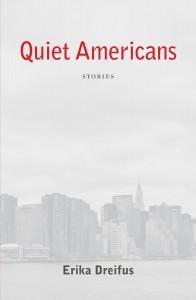Thursday’s (Penultimate) Pre-Publication Post
 It has been an exciting and eventful week for Quiet Americans (and, therefore, for me).
It has been an exciting and eventful week for Quiet Americans (and, therefore, for me).
First, Quiet Americans received an incredibly detailed and perceptive review over on Gently Read Literature. I’m so grateful to reviewer Anne Whitehouse for her careful and generous reading. I can’t resist giving you a sample, so here’s the first paragraph:
The characters in Erika Dreifus’ profound first collection of stories, Quiet Americans, are first and foremost survivors, or else descended from, or married to survivors. They count themselves among the lucky few that got out alive, escaped from the vast conflagration of a people–European Jewry–and their distinguished culture—a broad, liberal, freedom-loving culture that had flourished despite a history of persecution and humiliation, but did not survive the Holocaust. They share a sense of life’s precariousness, of the accidents of destiny. They fear that in an instant they might lose all that constitutes their position and well being. They find themselves caught between a sense of hard reality and a hope for the future. They are “quiet Americans” because they don’t tend to speak out or try to call attention to themselves. They don’t want to make a fuss and are generally grateful to be left alone—“better not to give crazy people any reason to get any crazier.”
(By the way, reviews and press about Quiet Americans will henceforth be collected right here.)
Next, I was thrilled to see Quiet Americans emerge as an enthusiastic subject of conversation on this month’s EarlyWord Galley Chat on Twitter. (Also gleaned that a review will be published in the March issue of Shelf Unbound.) Thanks to everyone who participated in the chat for the surprise highlight of my Tuesday!
Finally (drumroll, please!): Quiet Americans is now available on Amazon.com. Yes, I know the official release date is January 19. But if you know me at all, and you know that I’m working with a micropress where the authors are heavily involved with the publication process, you’re not surprised that the book is available a little bit ahead of time.
In related news: Behind the scenes, I’m continuing to prepare for our Winter Blog Tour and my upcoming events in Washington, D.C.
Please stay tuned for next week’s Thursday post–our last one before we shift officially from “pre-publication” to “post-publication” posts!